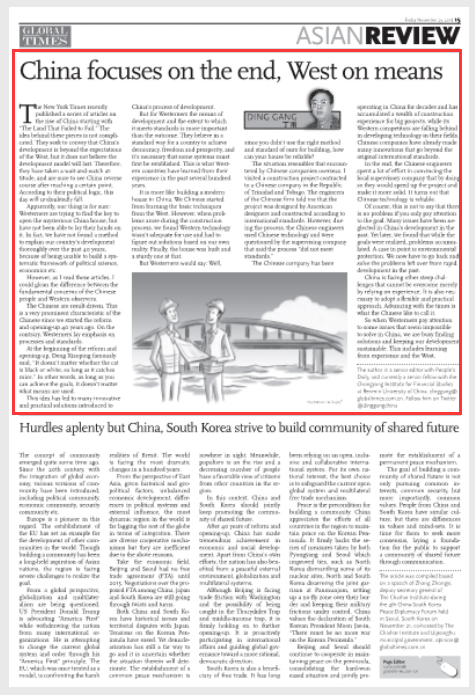Major Power Relations
Your Present Location: PROGRAMS> Major Power RelationsDing Gang: China focuses on the end, West on means
By Ding Gang Source: Global Times Published: 2018-11-22
The New York Times recently published a series of articles on the rise of China starting with "The Land That Failed to Fail." The idea behind these pieces is not complicated. They seek to convey that China's development is beyond the expectations of the West, but it does not believe the development model will last. Therefore, they have taken a wait-and-watch attitude, and are sure to see China reverse course after reaching a certain point. According to their political logic, this day will undoubtedly fall.

Apparently, one thing is for sure: Westerners are trying to find the key to open the mysterious China house, but have not been able to lay their hands on it. In fact, we have not found a method to explain our country's development thoroughly over the past 40 years, because of being unable to build a systematic framework of political science, economics etc.
However, as I read these articles, I could glean the difference between the fundamental concerns of the Chinese people and Western observers.
The Chinese are result-driven. This is a very prominent characteristic of the Chinese since we started the reform and opening-up 40 years ago. On the contrary, Westerners lay emphasis on processes and standards.
At the beginning of the reform and opening-up, Deng Xiaoping famously said, "It doesn't matter whether the cat is black or white, so long as it catches mice." In other words, as long as you can achieve the goals, it doesn't matter what means are used.
This idea has led to many innovative and practical solutions introduced to China's process of development.
But for Westerners the means of development and the extent to which it meets standards is more important than the outcome. They believe in a standard way for a country to achieve democracy, freedom and prosperity, and it's necessary that some systems must first be established. This is what Western countries have learned from their experience in the past several hundred years.
It is more like building a modern house in China. We Chinese started from learning the basic techniques from the West. However, when problems arose during the construction process, we found Western technology wasn't adequate for use and had to figure out solutions based on our own reality. Finally, the house was built and a sturdy one at that.
But Westerners would say: Well, since you didn't use the right method and standard of ours for building, how can your house be reliable?
The situation resembles that encountered by Chinese companies overseas. I visited a construction project contracted to a Chinese company in the Republic of Trinidad and Tobago. The engineers of the Chinese firm told me that the project was designed by American designers and constructed according to international standards. However, during the process, the Chinese engineers used Chinese technology and were questioned by the supervising company that said the process "did not meet standards."
The Chinese company has been operating in China for decades and has accumulated a wealth of construction experience for big projects, while its Western competitors are falling behind in developing technology in their fields. Chinese companies have already made many innovations that go beyond the original international standards.
In the end, the Chinese engineers spent a lot of effort in convincing the local supervisory company that by doing so they would speed up the project and make it more solid. It turns out that Chinese technology is reliable.
Of course, this is not to say that there is no problem if you only pay attention to the goal. Many issues have been neglected in China's development in the past. Yet later, we found that while the goals were realized, problems accumulated. A case in point is environmental protection. We now have to go back and solve the problems left over from rapid development in the past.
China is facing other steep challenges that cannot be overcome merely by relying on experience. It is also necessary to adopt a flexible and practical approach. Advancing with the times is what the Chinese like to call it.
So when Westerners pay attention to some issues that seem impossible to solve in China, we are busy finding solutions and keeping our development sustainable. This includes learning from experience and the West.
The author is a senior editor with People's Daily, and currently a senior fellow with the Chongyang Institute for Financial Studies at Renmin University of China.























































































 京公网安备 11010802037854号
京公网安备 11010802037854号





